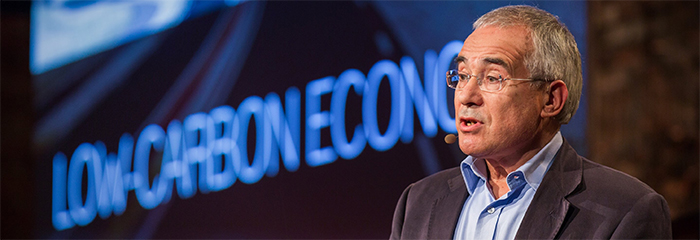Climate change policy and economic growth
Nicholas Stern (Co-Chair), Dimitri Zenghelis (Acting Chief Economist) and other members of the ESRC Centre for Climate Change Economics and Policy made significant contributions to the inaugural report of the New Climate Economy project by the Global Commission on the Economy and Climate. The Commission’s report, ‘Better Growth, Better Climate’, was originally conceived as a follow-up to the highly influential ‘The Economics of Climate Change: The Stern Review’, which was published by the UK Government in 2006.
The Commission’s report was commissioned by the governments of Colombia, Ethiopia, Indonesia, Norway, South Korea, Sweden and the United Kingdom, and was carried out by a consortium of nine research institutes around the world, including London School of Economics and Political Science. Lord Stern co-chaired the Commission with Felipe Calderón, the former Mexican President, and chaired its Economics Advisory Panel.
The Commission’s report was launched at the United Nations in New York in September 2014. Speaking at the launch, Ban Ki-Moon, the United Nations Secretary–General, said: “With this report, I sincerely hope that decision-makers in the public and private sector have a set of concrete recommendations for sustainable low-carbon economic growth”. Regional versions of the Commission’s report have been published in many of the countries which have the largest annual emissions of greenhouse gases, including the United States, China and India.
One of the main findings of the report is that many of the actions to limit climate change by cutting emissions of greenhouse gases also have significant social and economic co-benefits, such as improving local air quality and reducing traffic congestion. As a result, the net long-term costs of tackling climate change are much less than previously assumed. This finding has proved extremely influential during the negotiations over a new international agreement on climate change, which is expected to be finalised at the United Nations climate change summit in Paris, France, in December 2015. Such an agreement is regarded as crucial in ensuring that global warming does not exceed 2°C above pre-industrial level, which countries have agreed would create unacceptable risks of dangerous climate change to billions of people around the world.
Todd Stern, the United States Special Envoy on Climate Change, highlighted the Commission’s report in a speech in October 2014: “And just last month, an international coalition led by former Mexican President Felipe Calderón, released ‘The New Climate Economy’, an important report on achieving economic growth while fighting climate change. The report doesn’t sugar-coat the challenge of the clean energy transformation, but says it is achievable at a relatively modest upfront cost that is likely to pay for itself over time – if we get the policy right.” In addition, representatives from the Commission were invited to meet with His Holiness, Pope Francis, in May 2015 to discuss the report’s findings ahead of the publication of his Encyclical Letter on the environment.
While much of the outreach for the Commission’s report has focused on policy-makers, substantial efforts have also been undertaken by the Institution to engage the public directly and through the media. For instance, Lord Stern has been interviewed by print and broadcast media all across the world about the main findings of the report, and provided many op-eds (eg co-authored with Angel Gurría, the Secretary-General of the Organisation for Economic Cooperation and Development, for ‘The Guardian’). He also recorded a TED talk about the main themes of the report, which has now been viewed more than 650,000 times since September 2014. The report’s themes are also covered in detail in Lord Stern’s book, ‘Why Are We Waiting? The Logic, Urgency, and Promise of Tackling Climate Change’, which was published simultaneously in the United States and United Kingdom in June 2015.



